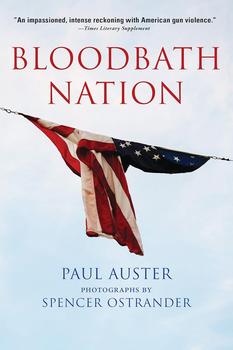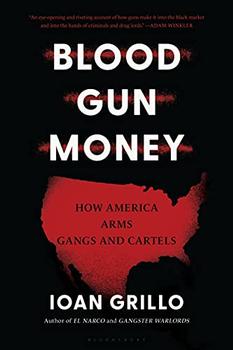Summary | Excerpt | Reviews | Beyond the book | Read-Alikes | Genres & Themes | Author Bio

An intimate and powerful rumination on American gun violence by Paul Auster, one of our greatest living writers and "genuine American original" (The Boston Globe), in an unforgettable collaboration with photographer Spencer Ostrander
Like most American boys of his generation, Paul Auster grew up playing with toy six-shooters and mimicking the gun-slinging cowboys in B Westerns. A skilled marksman by the age of ten, he also lived through the traumatic aftermath of the murder of his grandfather by his grandmother when his father was a child and knows, through firsthand experience, how families can be wrecked by a single act of gun violence.
In this short, searing book, Auster traces centuries of America's use and abuse of guns, from the violent displacement of the native population to the forced enslavement of millions, to the bitter divide between embattled gun control and anti-gun control camps that has developed over the past 50 years and the mass shootings that dominate the news today. Since 1968, more than one and a half million Americans have been killed by guns. The numbers are so large, so catastrophic, so disproportionate to what goes on elsewhere, that one must ask why. Why is America so different—and why are we the most violent country in the Western world?
Interwoven with Spencer Ostrander's haunting photographs of the sites of more than thirty mass shootings in all parts of the country, Bloodbath Nation presents a succinct but thorough examination of America at a crossroads, and asks the central, burning question of our moment: What kind of society do we want to live in?
A portion of proceeds from this book will be donated to the Violence Policy Center, a nonprofit organization working to stop gun death and injury through research, education, and advocacy.
In five short chapters, each of which reads more or less like a standalone essay, Auster compels readers to confront the ugliness of where we find ourselves, the ways in which we have come to expect gun violence in virtually every public and private realm, from schools and nightclubs to grocery stores and even churches and synagogues. He traces the links between social media, hatred and troubled young men's compulsion to be the next one to prompt sensationalistic headlines. Auster also touches on the tangled connections between political discourse and gun rights, though—like many Americans—he acknowledges that the answer to extracting ourselves from this epidemic is anything but simple...continued
Full Review
 (709 words)
(709 words)
(Reviewed by Norah Piehl).
.png) Thanks to the numerous photographs that accompany Paul Auster's prose, Bloodbath Nation reads like an extended photo essay, the combination of words and pictures creating a truly indelible work. The images were recorded by New York City–based photographer Spencer Ostrander, for whom this work is deeply personal.
Thanks to the numerous photographs that accompany Paul Auster's prose, Bloodbath Nation reads like an extended photo essay, the combination of words and pictures creating a truly indelible work. The images were recorded by New York City–based photographer Spencer Ostrander, for whom this work is deeply personal.
Ostrander, who was born in Seattle, Washington in 1984, experienced a series of personal tragedies the year he turned 21, when several important people in his life died in close succession. Although he had been studying psychology up until that point, the realization that he lacked permanent images of those loved ones led him to explore photography, first as a hobby and then as a profession.
After transferring from a...

If you liked Bloodbath Nation, try these:

by Brian VanDeMark
Published 2025
A definitive history of the fatal clash between Vietnam War protestors and the National Guard, illuminating its causes and lasting consequences.

by Ioan Grillo
Published 2023
The gun control debate is revived with every mass shooting. But far more people die from gun deaths on the street corners of inner city America and across the border as Mexico's powerful cartels battle to control the drug trade.